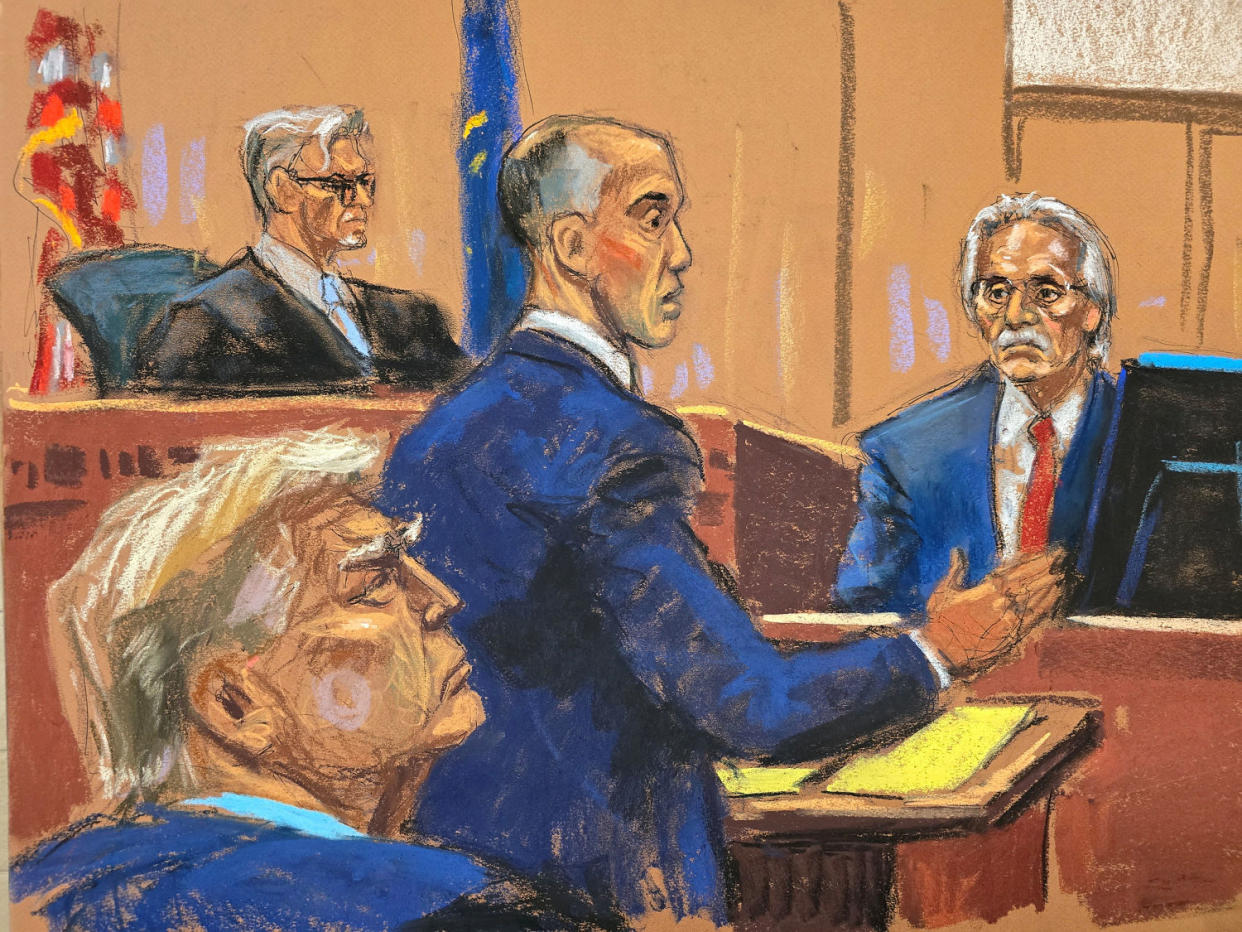Key prosecution witness in Trump trial faces grilling from former president's lawyers
The prosecution's first witness in its case against Donald Trump was back on the stand Friday as defense attorneys tried to combat the story he has laid out about how the former president was involved in efforts to quash "embarrassing" stories that could have hurt him during the 2016 campaign.
Former National Enquirer publisher David Pecker's testimony marks the end of the second week of Trump's hush money trial.
Since he took the stand Monday, Pecker has told jurors that Trump and his then-lawyer Michael Cohen had asked him to in a 2015 meeting be their "eyes and ears" when it came to salacious stories that could undermine Trump's candidacy, and also asked him to print negative stories about Trump's opponents.
Pecker testified on Thursday that Trump thanked him for his help in suppressing two scandalous stories in a 2017 meeting at Trump Tower, when Trump was president-elect. On Friday, Trump attorney Emil Bove asked Pecker about an FBI interview he sat for in 2018, where the agents said he told them "Trump did not express any gratitude” for his help.
“So the FBI notes here what somebody is writing down could be wrong," Pecker said, adding, "I know what the truth is," and it's that Trump thanked him for his assistance.
“So your testimony is inconsistent with what is written in that report?” Bove pressed. “Yes,” Pecker replied.
Bove also got Pecker to acknowledge his paper had already been running negative articles about Hillary Clinton, who would become the Democratic nominee for president Trump would face off against. Running negative stories about Clinton and her husband, former President Bill Clinton, was "no issue for you, correct?" Bove asked. Pecker said it was not.

Bove also noted that negative articles about Trump's Republican rivals in the race at the time, Sen. Marco Rubio of Florida and Dr. Ben Carson, contained information that was recycled from other news outlets, and asked if that “was cost-efficient and made business sense.” "Yes," Pecker replied.
Pecker was also questioned about the Enquirer's files and records on Trump, which he had said Trump wanted to purchase and Cohen had asked to go through.
“You’re not suggesting that there’s some trove of sensitive information about President Trump at the Enquirer,” Bove said.
Pecker replied "there's nothing in those boxes."
"They are worthless?" Bove continued.
"Yes," Pecker responded.
When cross-examination began Thursday, Trump attorney Bove immediately set out to poke holes in Pecker's credibility, getting him to acknowledge times he had mixed up dates and that the passage of time could affect his memory.
“There are some gaps, correct? Because it was a long time ago?” Bove asked.
“Yes,” Pecker replied.
Bove also got Pecker, 72, to acknowledge that it wasn't unusual for the paper to buy stories from sources that it wouldn't print. Pecker said about half the stories it bought didn't wind up getting printed, although some about celebrities were used as leverage to get other stories from those celebrities. He said the tabloid had used hundreds of thousands of non-disclosure agreements with sources over the years.
Prosecutor Joshua Steinglass asked on re-direct examination on Friday afternoon how many of those NDAs they'd coordinated with a presidential candidate in order to help their campaign. "It's the only one," Pecker replied.
He added it was also the only one where he'd negotiated with a "presidential candidate's fixer" — Cohen — on the terms of those NDAs.
Pecker testified this week that he was involved in efforts to kill three stories that could have been damaging to Trump's 2016 campaign. The first involved a doorman who claimed Trump fathered an illegitimate child. The paper paid the doorman $30,000 for his silence, even though, Pecker told the court, the claim was later determined to be “absolutely 1,000% untrue.”
The second story involved former Playboy model Karen McDougal, who claimed to have had a monthslong affair with Trump that began in 2006. Pecker said he believed her account, in part because, he said, Trump had told him that she was "a nice girl." Pecker wound up paying her $150,000 for the rights to her story, money he said he initially wanted Trump to pay back before he decided it could cause him legal problems if Trump did so.
Trump has denied McDougal's claims of an affair.
Pecker added that in 2017 Trump invited him to the White House, where he thanked him for his help, saying the stories from the doorman and McDougal would have been "embarrassing."
Pecker testified that he was less involved in the third story, which involved adult film actor Stormy Daniels. Daniels claims she had a sexual encounter with Trump in 2006, which Trump denies. Pecker said he refused to pay her for her story but encouraged Cohen to do so.
Pecker told the court that one of his employees, Enquirer editor-in-chief Dylan Howard, helped negotiate the terms of their eventual $130,000 deal. Trump later repaid Cohen in payments that were listed as legal expenses, which prosecutors say was a sham.
Trump has pleaded not guilty to 34 counts of falsifying business records.
